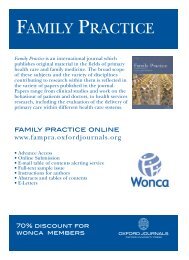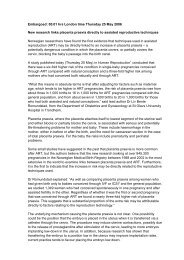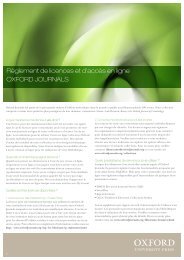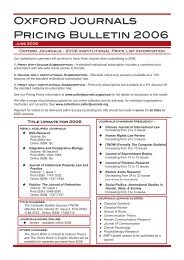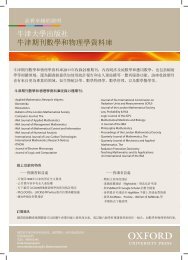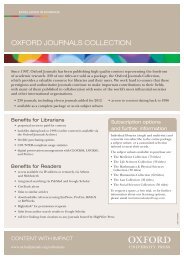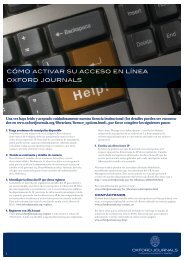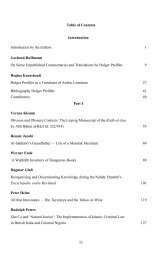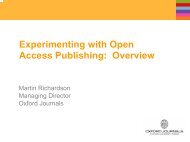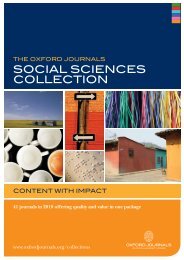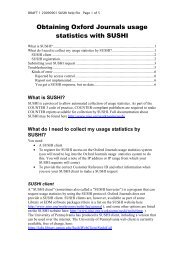Download the ESMO 2012 Abstract Book - Oxford Journals
Download the ESMO 2012 Abstract Book - Oxford Journals
Download the ESMO 2012 Abstract Book - Oxford Journals
You also want an ePaper? Increase the reach of your titles
YUMPU automatically turns print PDFs into web optimized ePapers that Google loves.
<strong>ESMO</strong> DCTF-AORTIC-SLACOM-UICC-<br />
WHO Joint Symposium:<br />
Independent and publicly funded<br />
research: A new global model<br />
132IN GLOBAL CANCER RESEARCH; CURRENT SITUATION AND<br />
CHALLENGES<br />
E.L. Cazap<br />
Latinamerican & Caribbean Society for Medical Oncology (SLACOM), Buenos<br />
Aires, ARGENTINA<br />
Clinical research is vital to <strong>the</strong> development and improvement of methods to prevent,<br />
detect and treat cancer. The majority of clinical trials take place in <strong>the</strong> developed world<br />
through sponsored pharmaceutical company research. The corresponding lack of<br />
research in developing countries results in two unmet needs related to cancer<br />
treatment in <strong>the</strong> developing world. First, recommended treatments do not reflect<br />
ethnic (genetic), cultural and resource differences between developed countries and<br />
developing countries that are not subject to clinical research. Second, <strong>the</strong>re is little<br />
research conducted on those cancers that are primarily found in developing countries.<br />
Thus <strong>the</strong> ability to diagnose and treat <strong>the</strong>se diseases is impaired. This general picture<br />
reflects today’s situation globally, <strong>the</strong>n it is critical to promote clinical research in<br />
developing countries mainly with training of all levels of research professionals (data<br />
managers, research nurses, etc.) in a local context, and training on identifying<br />
resources to fund research outside of pharmaceutical company sponsorship.<br />
Disclosure: E.L. Cazap: Leadership Position SLACOM, ASCO, UICC Consultant:<br />
Bayer; Schering Pharma Honoraria: Bayer; Bristol-Myers Squibb; Fresenius Research<br />
Funding: Poniard Pharmaceuticals; Daiichi Sankyo Pharma; Breast Cancer Research<br />
Foundation (BCRF).<br />
133IN INDEPENDENT CANCER RESEARCH IN LATIN AMERICA: A<br />
NEW MODEL<br />
C. Vallejos-Sologuren<br />
Division of Research, Oncosalud SAC, Lima, PERU<br />
It is well known that pharmaceutical Industry leads <strong>the</strong> cancer research in Latin America,<br />
but also is well known that <strong>the</strong>re is a large pool of well-trained oncologists and basic<br />
scientists able to lead successfully scientific research of complex designs. A recent survey<br />
by Gomez et al (presented in <strong>the</strong> extended educational session at ASCO Annual Meeting<br />
2011), that involved <strong>the</strong> perception of oncologist from low income countries; reveals <strong>the</strong><br />
desires of Latin American medical oncologists to participate in clinical research from <strong>the</strong><br />
international cooperative groups. We - <strong>the</strong> Latin-American researchers- have learned that<br />
<strong>the</strong> academical investigation and <strong>the</strong> participation in <strong>the</strong> concept of study and research<br />
design is <strong>the</strong> best way to achieve academicals status. We have bet in <strong>the</strong> formation of local<br />
and regional cooperative groups, and we are doing efforts to implement research sites of<br />
excellence, improve our quality of data and seeking for collaboration of scientist from<br />
more developed countries to perform research involving complex procedures (eg.<br />
molecular analysis). Nowadays, <strong>the</strong> goal for our young researchers is get trained in<br />
renamed international institutions and establish strong links with o<strong>the</strong>r worldwide<br />
scientists. The future of research in our region reveal a landscape where we work toge<strong>the</strong>r<br />
to fight <strong>the</strong> cancer in benefit of our patients.<br />
Disclosure: The author has declared no conflicts of interest.<br />
134IN WHO AND CANCER RESEARCH<br />
No abstract submitted at time of going to press.<br />
135IN CANCER RESEARCH IN AFRICA<br />
I. Adewole<br />
Obstetrics and Gynaecology, College of Medicine, University of Ibadan, Ibadan,<br />
NIGERIA<br />
Cancer remains a public health challenge worldwide, and its fast rising nature in<br />
Africa is occasioned by <strong>the</strong> changing demographic and environmental characteristics.<br />
The epidemic is fur<strong>the</strong>r propelled by HIV/AIDS, poverty and ignorance within <strong>the</strong><br />
continent. At <strong>the</strong> moment, cancer is currently responsible for more than 7 million<br />
deaths per year. By 2030, it is projected that cancer alone will account for about 1.27<br />
million new cases and about a million deaths per annum.<br />
Disease prioritization is often a product of cutting edge research, and it is also a driver<br />
for follow-up implementations. The differential opportunity for sound translational<br />
research between developed countries and Africa is one of <strong>the</strong> key causal factors<br />
responsible for disease outcome between <strong>the</strong> two settings. At moment, <strong>the</strong> quality of<br />
cancer research is yet to offer <strong>the</strong> much-needed platform to generate a momentum for<br />
cancer prioritization in Africa. Cancer research from Africa is mostly donor funded,<br />
lacks depth of contextual framework - sociocultural, minimal multi-national outlook,<br />
lean basic science component, and low translational potential. O<strong>the</strong>r challenges<br />
include poor research friendly environment (laboratory, incentives and recognition);<br />
lack of mentoring programs, public funding comparable to NIH is non-existence, lack<br />
of robust cancer registry with necessary resources, and poor political support. The<br />
African Organisation for Research and Training in Cancer (AORTIC) has <strong>the</strong> vision of<br />
transforming <strong>the</strong> orientation of cancer researchers within <strong>the</strong> continent through<br />
provision of research capacity building opportunities, generation of a critical mass of<br />
cancer researchers that will form <strong>the</strong> core of <strong>the</strong> network, leading advocacy for local<br />
funding of cancer research in Africa, and promotion of center of excellence in cancer<br />
research at national and sub-regional level. It is imperative that cancer research in<br />
Africa charts a course that is visionary, pragmatic, multidisciplinary and sustainable as<br />
well as avoiding a “one perch approach”. A holistic approach to cancer research that<br />
will use both inductive and deductive reasoning philosophy is hereby advocated.<br />
Disclosure: The author has declared no conflicts of interest.<br />
136IN INTERNATIONAL RESEARCH<br />
Annals of Oncology 23 (Supplement 9): ix65, <strong>2012</strong><br />
doi:10.1093/annonc/mds489<br />
T. Cufer<br />
Department of Medical Oncology, University Clinic Golnik, Golnik, SLOVENIA<br />
Substantial increase in international clinical cancer research (CCR) observed during<br />
<strong>the</strong> last decade is due to fragmentation of major cancer types in biological subtypes<br />
with plethora of new treatment agents, both requiring a larger number of CCR<br />
participants, as well as to improved infrastructure and skills needed to perform CCR<br />
in developing countries. Based on ClinicalTrials.gov registry approx. one third of both<br />
academia- and industry-driven CCR is running on international basis nowadays: and<br />
<strong>the</strong> number of countries serving as trial sites in CCR reports published in prestigious<br />
journals doubled during <strong>the</strong> last decade. The scientific and logistical imperative for<br />
international CCR is clear, it shortens <strong>the</strong> time for clinical testing, offers an early<br />
access to new treatment strategies worldwide and lowers costs by establishing<br />
international networks of CCR. Clinical trials cooperative groups, already established<br />
as regional international groups (e.g. NCI-CTG, RTOG, NCIC, EORTC, CECOG,<br />
BIG, etc.), offer an excellent platform for exchange of scientific ideas, avoid<br />
unnecessary duplication of trials and represent a solid base for expanding international<br />
collaboration. But, <strong>the</strong>re are still a lot of regulatory, logistical, financial and scientific<br />
issues to be solved to fur<strong>the</strong>r improve international CCR and maximize its outcome.<br />
Regulatory requirements and oversight of <strong>the</strong> CTs need to be harmonized with data<br />
and tissue handling representing one of <strong>the</strong> main issues. Protection of publication<br />
rights and access to trial data is of upmost importance for transparency of CCR in<br />
developing countries. The drugs being evaluated in CCR must be available in<br />
participating countries, when approved. Formal training programs in CCR and ethics<br />
intended to future CCR leaders in developing countries, such as ICTW courses<br />
organized by ASCO and o<strong>the</strong>r academia organized GCP courses, need to be<br />
promoted. Effective collaboration between industry and cooperative groups has to be<br />
established. Our ability to establish international collaboration in CCR will results in<br />
maximization of our resources and patients, thus permitting international community<br />
to fur<strong>the</strong>r improve cancer control globally through effective CCR.<br />
Disclosure: The author has declared no conflicts of interest.<br />
Volume 23 | Supplement 9 | September <strong>2012</strong> doi:10.1093/annonc/mds489 | ix65



